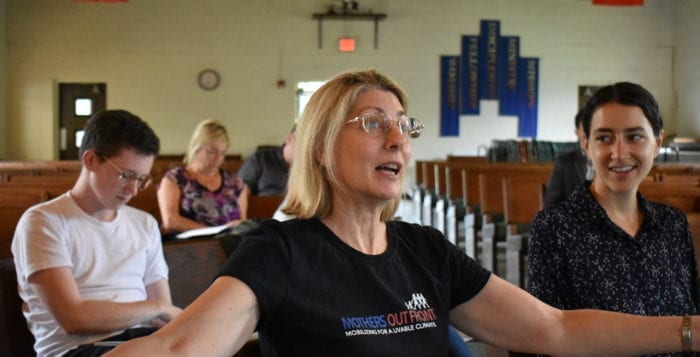By Kyle Barr
A Huntington Station church recognizes that the Bible says God made light and it is good, now if only they could afford to reap the sun’s benefits.
Bethany Presbyterian Church is one of many houses of worship with an interest in harvesting solar energy, but many are finding the upfront costs are too high.
In 2017, the church financed an audit of its electric system and insulation in an effort to increase its energy efficiency, Pastor James Rea Jr. said. While this helped reduced the congregation’s electrical bill by 20 percent, according to Rea, the congregation is interested in taking it a step further.
“We would do solar, but we just can’t afford it right now.”
– Christopher Sellers
“We would do solar, but we just can’t afford it right now,” Christopher Sellers, an elder at Bethany Presbyterian, said, noting the church is still paying for the energy audit.
While renewable energy proponents point to community solar initiatives, where the output from a solar farm is shared among multiple buildings, there is still a large upfront cost and requires a significant amount of space to build the solar farm according to Ryan Madden, a sustainability organizer for Long Island Progressive Coalition.
“We need solutions like community solar,” Madden said. “Our version of community solar takes the form of bringing in multiple organizations at the same time to bring down cost and creating locally driven solar campaigns.”
LIPC partnered with Massachusetts-based company Resonant Energy, which works with nonprofits to provide low-cost solar, to create the PowerUP Solar initiative. The initiative seeks to bring together nonprofits and churches for the intent of purchasing solar systems in bulk to help decrease the cost. PowerUP member organizations held a meeting with other interested groups June 13 at the Huntington Station church to advertise their plans.
Madden said nonprofits have a difficult time when it comes to getting a solar hookup simply because of the issue of affordability.
“We’ve seen widespread adoption in single-family homes, but not so much in small commercial spaces.”
– Isaac Baker
“They are not usually looked at by solar developers because its more expensive, or there are multiple decision makers in those organizations that can stall a project,” he said.
Other than cost, Isaac Baker, the co-president of Resonant Energy, said the nonprofits also have to contend with a lack of incentives to get into solar, specifically that nonprofits are not eligible for the federal
solar tax credits that homeowners or for-profits can get. There are no current programs that financially help New York organizations transition from traditional electric to solar.
“We’ve seen widespread adoption in single-family homes, but not so much in small commercial spaces,” Baker said. “[A large amount] of rooftop is available in any state on small commercial buildings that are owned by nonprofits.”
Some religious organizations on Long Island have already invested heavily in solar technology. The Sisters of St. Joseph in Brentwood made a big splash earlier this year when they unveiled their community solar system on their main campus. The 3,192 solar photovoltaic panels on their roof power 63 percent of the convent’s residential and office space on the 212-acre property.
Karen Burke, the coordinator of land initiatives for the Sisters of St. Joseph, said that her sisterhood was looking to make the switch at other facilities.
“The town is really into getting into as much solar as possible, so this is a great untapped resource.”
– Billii Roberti
Baker said that if the PowerUP can bring together 10 different organizations, bulk pricing could bring the cost of solar panels down to $114,000 per building with 56 kilowatts of output. The initiative’s members were promised to save approximately $2,200 per year and a net savings of $212,000 in 25 years, according to Baker.
The time line for the PowerUP initiative would have the nonprofits and churches getting technical assessments by the end of July, having installation done in September and the systems up and running by October.
Billii Roberti, a member on the Town of Huntington’s Advisory Committee on Energy Efficiency, Renewables and Sustainability, said that Huntington should try to look to nonprofits to proliferate sustainable energy.
“[This initiative is] bringing in people who are otherwise unable to take advantage of solar, people who are disenfranchised in a sense,” Roberti said. “The town is really into getting into as much solar as possible, so this is a great untapped resource.”





